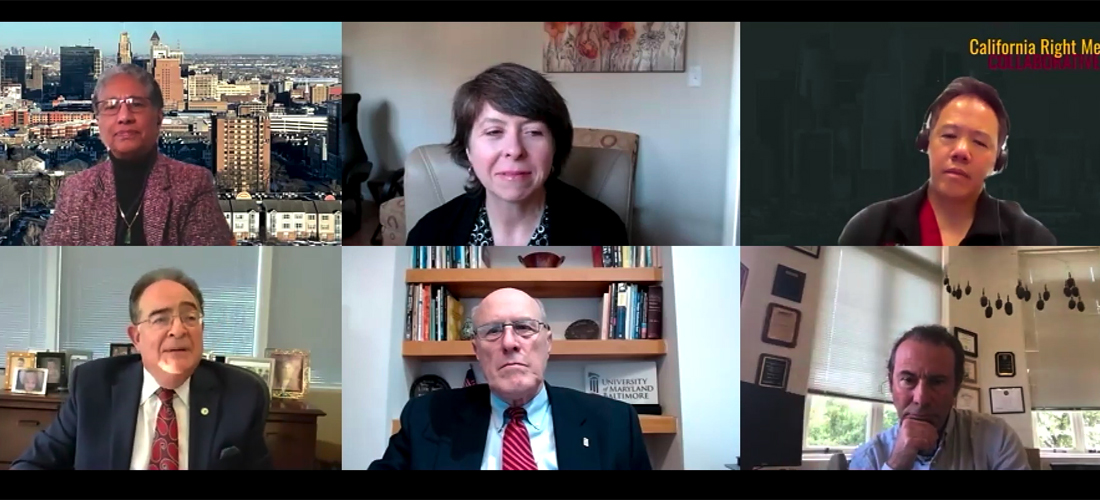March 2021
On March 8, the University of Maryland, Baltimore (UMB) partnered with the University of Maryland, College Park (UMCP) and the University System of Maryland (USM) to bring together a panel of experts from across the country to discuss health literacy as a social determinant of health. In the midst of a global pandemic that has disproportionately affected people of color, this topic is a critical discussion point and the focus of this year’s President’s Symposium and White Paper Project.
“A patient who is well informed and health literate can become an active decision maker for his or her own health as well as the health of his or her family,” Bruce E. Jarrell, MD, FACS, the president of UMB, said in his opening remarks.

Denise V. Rodgers, MD, FAAFP (top left), Cynthia Bauer, MD (top middle), Steven W. Chen, PharmD, FASHP, FCSHP, FNAP (top right), Jay A. Perman, MD (bottom left), Bruce E. Jarrell, MD, FACS (bottom middle), and Dean Schillinger, MD (bottom right), gather virtually to discuss health literacy as a social determinant of health.
This year’s panel was held virtually over a Webex video conference and was hosted by USM Chancellor Jay A. Perman, MD. Prior to becoming the fifth USM chancellor, Perman served as president of UMB for nearly a decade and still teaches in UMB’s President’s Clinic. During the panel, he explained that he often emphasizes the importance of health literacy to his students and that their work does not end with a diagnosis.
“If you think that by making the correct diagnosis and prescribing the correct therapy you have served the patient and you’re done, then you are fooling yourself. You are not done,” he said. “Far too many of our patients and families come with a broader context. They may have limited understanding of what we assume they know, or what we assume they understand and that's on us. That's for us to fix.”
One of the panelists, Steven W. Chen, PharmD, FASHP, FCSHP, FNAP, associate dean for clinical affairs at the University of Southern California, expanded on Perman’s point with an anecdote about a diabetes patient who was not responding to his insulin treatments. Chen decided to make a home visit to see how the patient was administering his insulin treatments and found that the patient was living out of a camper behind a gas station. It was then that Chen realized that the insulin doses were being stored in a broken refrigerator during the summer. The warm temperatures were causing the insulin to not work effectively in the patient. This anecdote drove home the point of why it’s so important for physicians and health care providers to work together to keep their patients actively informed about their health.
“Once a patient leaves your office or clinic or hospital, it's the Wild West,” Chen said. “You did the best you could in clinic, you hope that things work out, and sometimes they don't. As a pharmacist, health literacy about medication management is critical because the pharmacy is the last chance to get things right before the patients go off to their homes. This is why I am a big advocator for team-based care. I think everybody wins when the health care team is aligned, and you have everyone doing the right jobs.”
The other experts on the panel included Cynthia Bauer, MD, endowed professor at UMCP and the director of the Horowitz Center for Health Literacy, Dean Schillinger, MD, professor of medicine at the University of California, San Francisco, and Denise V. Rodgers, MD, FAAFP, vice chancellor for interprofessional programs at Rutgers Biomedical and Health Sciences (RBHS) and the RBHS chair of Interprofessional Education at Rutgers. They all echoed Chen’s sentiment that the way to increase health literacy is to implement team-based care and have a foundational understanding that health care does not end when the patient leaves the doctor’s office.
“Teams are a key to the solution to this health literacy problem,” said Rodgers. “One of the things we want to do is provide care in the context of highly effective, collaborative teams, and make sure that we're all on the same page in terms of messaging. Then, we can reinforce those messages with our patients.”
Rodgers went on to explain that medical providers can start by making a concerted effort to engage their patients so that they can take an active role in their own health. She encourages health care providers to ask their patients three questions: What is my main problem? What do I need to do? Why is this important for me to do?
The President’s Fellows plan to address and expand upon all of these points in their White Paper Project. The President's White Paper Project engages nine students from the schools of dentistry, law, medicine, nursing, pharmacy, public health, and social work from UMB and UMCP on a yearlong research project. Past White Paper Projects included topics such as Global Literacy, Gun Violence, and Implementing Core Values.
“This year, the key question that the fellows are asking is, ‘What is the university's role in teaching our students, as well as we, the faculty and staff, about this topic?’” Jarrell explained. “In doing this, we can improve the relationship between the provider and the patient, which is certainly an important part of our mission.”
The fellows will be presenting their findings in a culminating, virtual event on April 6.
(View event on The Elm.)
Search UMB News
Sign up for UMB Alerts.



